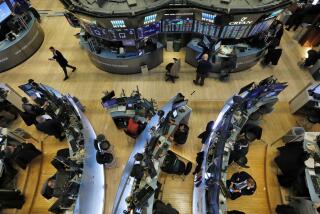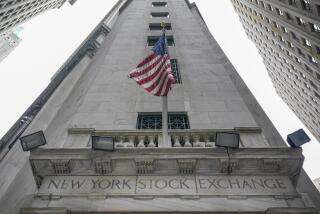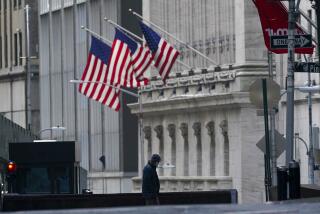Foreign Indexes End Lower on New Fears
Most major foreign stock markets ended lower Monday in the absence of guidance from holiday-shuttered U.S. markets.
In Europe, Zurich Financial and other insurers dragged shares down on jitters over the companies’ finances.
Also, airline shares including Lufthansa sank after details of a thwarted potential hijacking of a flight from Sweden last week renewed fears over the sector’s vulnerability to terrorism.
Stocks also were mostly weaker in Asia and Latin America.
Wall Street was closed for Labor Day, which left foreign investors without a key source of direction and kept trading light.
Shares in Zurich Financial slumped 11% after a Swiss newspaper reported that the company, Europe’s third-largest insurer, is poised to announce the need to raise $2.5 billion in capital. The company had no comment.
Insurers came under additional pressure after brokerage Morgan Stanley cut its recommendation on the sector to “cautious” from “in-line,” and raised the specter of radical restructurings in the industry because of capital shortfalls.
Insurers have been hit this year by heavy losses in their equity portfolios as global markets have tumbled.
The main Swiss market index fell 2.6% to 5,096.00 on Monday. In Germany, the DAX index slid 2.8% to 3,609.41, while France’s CAC-40 index dropped 2.8% to 3,272.76.
Shares of France Telecom slid 10% in Paris after L’Expansion magazine reported that the French government was in talks aimed at replacing Michel Bon at the helm of the debt-ridden company.
The report cited official disappointment at Bon’s handling of MobilCom, the group’s troubled German affiliate.
In Britain, the FTSE-100 index lost 1.1% to 4,180.90.
British mobile phone giant Vodafone fell 3.6% on worries it will have to dip into its coffers after a report in the Financial Times that it is preparing to make a $7.9-billion hostile bid for SFR, the French mobile phone company controlled by Vivendi Universal.
Some analysts warned that European markets are vulnerable to heavy selling in coming weeks.
“We have the view the market in Europe is likely to retest the lows we saw in July over the course of September and October,” said Jason James, European strategist at HSBC bank.
“The main problem is overvaluation in technology, and very likely large [secondary stock] issues in telecoms and possibly insurance. We have not convincingly hit bottom yet and the U.S. market looks overvalued to us,” James said.
In Asia on Monday, Japan’s benchmark Nikkei average fell 1%, ending at 9,521.63. Hong Kong’s Hang Seng index lost 1.5% to 9,896.98, and Taiwan’s weighted index dropped 2.5% to 4,644.58, the weakest level since Aug. 6.
But South Korean stocks bucked the trend. The Kospi index jumped 2.1% to 751.98.
In Mexico City, the IPC index dipped 0.8% to 6,165.93, while Brazil’s Bovespa index was down fractionally.
Mexican stocks fell after President Vicente Fox appealed to lawmakers in his State of the Nation address Sunday for help in passing measures the president says are needed to ensure sustained economic growth.
The opposition-controlled Congress has so far undermined the chief pillars of Fox’s domestic agenda by derailing a tax increase, shelving his initial plan to deregulate the $10-billion electricity industry and watering down an Indian rights bill.
More to Read
Inside the business of entertainment
The Wide Shot brings you news, analysis and insights on everything from streaming wars to production — and what it all means for the future.
You may occasionally receive promotional content from the Los Angeles Times.










